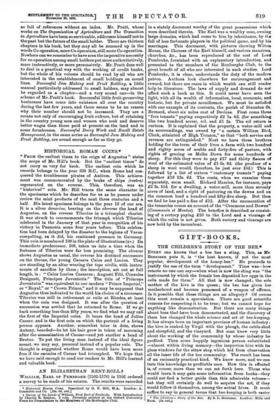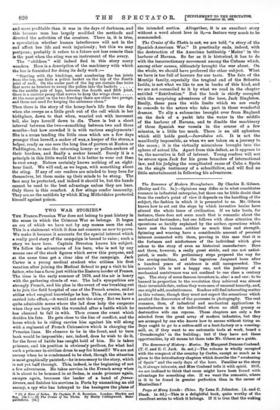G-IFT-BOOKS.
THE CHILDREN'S STORY OF THE BEE,
EVERY one knows that a bee has a sting. This, as Mr. Bensusan puts it, is "the best known, if not the most popular, development of the honey-bee." He proceeds to justify the use of the term "development." Time was—bow remote no one can say—when what is now the sting was "the instrument by which the female bee deposited her eggs in the cells made for them." All that is now changed ; the sole mother of the hive is the queen ; the bee has given her motherhood and become possessed of a weapon of offence. Is it possible that these things are an allegory ? Of course this must remain a speculation. There are good scientific reasons for suspecting it to be true; but we cannot hope for anything like demonstration. But there are many things about bees that have been demonstrated, and the discovery of them has changed the whole science and art of bee-keeping. It has always been an important province of human industry : the hive is ranked by Virgil with the plough, the cattle-shed and sheepfold, and the vineyard. But man knew very little about the working of the community by whose industry he profited. Then some happily ingenious person substituted —almost within living memory—the inspection hive with its glass windows for the straw skep which hid from observation all the inner life of the bee community. The result has been of an eminently practical kind. We know more, and we can turn this knowledge to profitable uses. How this is effected is, of course, more than we can set forth here. Those who would learn it may gain some information from books—they could not find a better guide than this admirable volume— but they will certainly do well to acquire the art, if they would follow it themselves, among the actual hives. It must suffice to say in general terms that bee-keeping is both easier • The Children's Story of the Bee. By S. L. Beneutan. London: Mille and Boon. (5e, net.] and more profitable than it was in the days of darkness, and this because man has largely modified the methods and directed the activities of the creature. There is, it is tine, a speculation whether human interference will not in the end affect bee life and work injuriously ; but this we may postpone ; probably it refers to a future not less remote than is the past when the sting was an instrument of the ovary.
The " children " will indeed find in this story many wonders. Here is a description of the machinery with which the bee is furnished for doing its daily work :— " Starting with the hind-legs, and numbering the ten joints from the top, one finds a pollen basket on the top of the fourth joint of each. On the under part of the leg are certain fine hairs that serve as brushes to sweep the pollen into the baskets. . . . . On the middle pair of legs, between the fourth and fifth joint, there is a curious prong that serves to keep the wings clean At the same point on the two fore-legs there are other two prongs, and these are used for keeping the antennae clean."
Then there is the story of the honey-bee's life from the day when she creeps as a little grub out of the cell which is her birthplace, down to that when, wearied out with incessant toil, she lays herself down to die. There is but a short interval between the two—something between two and three months—but how crowded it is with various employments !
She is a mime tending the little ones which are a few days younger than herself, a maker of wax, a keeper of the stores, a helper, ready as one sees the long line of porters at Euston or Paddington, to ease the returning honey- or pollen-seekers of their burdens, and finally a seeker herself. Surely it is a principle in this little world that it is better to wear out than to rust away. Nature certainly knows nothing of an eight- hour limit. We will end, as we began, with something about the sting. If any of our readers are minded to keep bees for themselves, let them make up their minds to be stung. The face may be protected, and indeed it should be, but the hands cannot be used to the best advantage unless they are bare. Only there is this comfort. A few stings confer immunity. They are as the antidote by which King Mithridates protected himself against poison.

























































 Previous page
Previous page